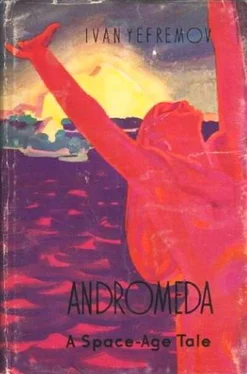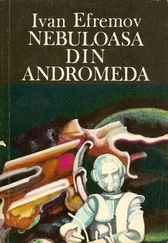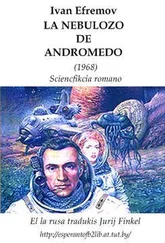Ivan Yefremov - Andromeda (A Space-Age Tale)
Здесь есть возможность читать онлайн «Ivan Yefremov - Andromeda (A Space-Age Tale)» весь текст электронной книги совершенно бесплатно (целиком полную версию без сокращений). В некоторых случаях можно слушать аудио, скачать через торрент в формате fb2 и присутствует краткое содержание. Город: Moscow, Год выпуска: 1959, Издательство: FOREIGN LANGUAGES PUBLISHING HOUSE, Жанр: Фантастика и фэнтези, на английском языке. Описание произведения, (предисловие) а так же отзывы посетителей доступны на портале библиотеки ЛибКат.
- Название:Andromeda (A Space-Age Tale)
- Автор:
- Издательство:FOREIGN LANGUAGES PUBLISHING HOUSE
- Жанр:
- Год:1959
- Город:Moscow
- ISBN:нет данных
- Рейтинг книги:5 / 5. Голосов: 1
-
Избранное:Добавить в избранное
- Отзывы:
-
Ваша оценка:
- 100
- 1
- 2
- 3
- 4
- 5
Andromeda (A Space-Age Tale): краткое содержание, описание и аннотация
Предлагаем к чтению аннотацию, описание, краткое содержание или предисловие (зависит от того, что написал сам автор книги «Andromeda (A Space-Age Tale)»). Если вы не нашли необходимую информацию о книге — напишите в комментариях, мы постараемся отыскать её.
Andromeda (A Space-Age Tale) — читать онлайн бесплатно полную книгу (весь текст) целиком
Ниже представлен текст книги, разбитый по страницам. Система сохранения места последней прочитанной страницы, позволяет с удобством читать онлайн бесплатно книгу «Andromeda (A Space-Age Tale)», без необходимости каждый раз заново искать на чём Вы остановились. Поставьте закладку, и сможете в любой момент перейти на страницу, на которой закончили чтение.
Интервал:
Закладка:
The far end of the cave merged into a high, straight passage that sloped down to an unknown depth. The instruments on the explorer cars showed a depth of three hundred and four metres from the surface at the beginning of the corridor. Huge crevices divided the ceiling into a number of separate limestone blocks that probably weighed several thousand tons each. Veda felt alarmed: her experience in the exploration of many underground premises told her that the rocks at the foot of the mountain chain were certain to be in a state of instability. The mass of rock may have been shifted by an earthquake or by the general rise of the mountains that had grown at least fifty metres higher in the centuries that had elapsed since the caves had been sealed. An ordinary archaeological expedition had no means at its disposal to strengthen such a huge mass. Only an objective of importance to the planet’s economy would have justified the expenditure necessary for the job.
At the same time historical secrets hidden in the deep cave might be of technical value, they might consist of such things as forgotten inventions that would be of value in modern times.
It would have been nothing more than wise precaution to abandon all further exploration. But why should a historian be so very careful of his own person? When millions of people were carrying out risky experiments and doing risky jobs, when Darr Veter and his companions were working at a height of fifty-seven thousand kilometres above the Earth, when Erg Noor was preparing to start out on a voyage from which there would be no return! Neither of these men whom Veda admired would have hesitated… nor would she!
They would take reserve batteries, an electronic camera, two oxygen apparatuses and would go alone, she and the fearless Miyiko, leaving their companions to study the third cave.
Veda advised her workers to take a meal to keep up their strength. They got out their travellers’ cakes, slabs of pressed, easily assimilated proteins, sugars and preparations destroying the toxins of weariness mixed with vitamins, hormones and nerve stimulants. Veda, nervously impatient, did not want to eat. Miyiko appeared some forty minutes later, she had been unable to resist the temptation of examining the contents of some of the cupboards with her gamma-rays.
The descendant of Japanese women divers thanked her principal with a glance and got herself ready in the twinkling of an eye.
The thin red cables stretched down the centre of the passage. The pale light emanating from the phosphorescent crowns worn by the two women was insufficient to penetrate the thousand-year-old darkness that lay ahead of them where the slope grew steeper. Big drops of cold water dripped steadily and dully from the roof. To the sides and below them they could hear the gurgle of streams of water running in the crevices. The air, saturated with moisture, was as still as death in that enclosed underground chamber. The silence was such as exists only in caves where it is guarded by the dead and inert matter of Earth’s crust. Outside, no matter how great the silence may be, nature’s hidden life, the movement of water, air and light may always be assumed.
Miyiko and Veda were unwittingly hypnotized by the cave that drew them into its black depths as though into the depths of a dead past that had been wiped out by time and lived only as figments of the imagination.
The descent was rapid although there was a thick layer of sticky clay on the floor. Blocks of stone fallen from the walls at times barred the way and had to he climbed over, the women crawling through the narrow space left between the fall and the roof. In half an hour Miyiko and Veda had descended another one hundred and ninety metres into the earth and reached a perfectly smooth wall at the foot of which the two explorer robots lay motionless. One flash of light was enough to show them that the smooth wall was a massive, hermetically sealed door of stainless steel. In the middle of the door were two convex circles with certain symbols on them, handles and gilded arrows. The lock opened when a pre-arranged signal had been selected. The two archaeologists knew of such safes belonging to an earlier period. After a short consultation Veda and Miyiko made a closer examination of the lode. It was very much like those malignantly clever constructions that people once used to keep other people’s hands off their property — in the Era of Disunity people were divided in that way into “us” and “others.” There had been a number of cases when an attempt to open such doors had caused an explosion or the emission of poisonous gases or deadly radiations, killing the unsuspecting investigators. The mechanism of such locks, made of non-oxidizing metals or plastics, was not affected by time: a large number of people had fallen victim to these steel doors before archaeologists had learned to render them harmless.
It was obvious that the door had to be opened with special instruments. They would have to go all the way back from the very threshold of the cave’s main secret. Who could doubt that the locked door would hide the most important and valuable possession of the people of those distant times. Putting out their lamps and making do with the glow of their phosphorescent crowns, Veda and Miyiko sat down to rest and eat in order to be able to repeat their attempt.
“What can there be in there?” asked Miyiko with a sigh, never once taking her eyes off the door and its haughtily gleaming gold symbols. “It seems to be laughing at us… ‘I won’t let you in, I won’t tell you anything!’ “
“What did you see in the cupboards you gamma-rayed in the second cave?” asked Veda, driving away her primitive and useless chagrin at this unexpected obstacle.
“Drawings of machines, books printed on metal sheets instead of on the old-fashioned paper made from wood. Then there was something that looked like rolls of films. some sort of lists, stellar and terrestrial maps. In the first hall there are samples of machines and in the second there are the technical documents belonging to them and in the third there are, well, what can I call them? — historical relics and the valuables of the period when money still existed. It all follows the usual scheme.
“Where are the things that we regard as being valuable? The loftiest achievements of man’s spiritual development — science, art, literature?” exclaimed Miyiko.
“I hope they’re behind that door,” answered Veda, calmly, “but I should not be at all surprised if there were weapons there.”
“What? What did you say?”
“Weapons, armaments, the means of slaughtering masses of people in the shortest possible time. I don’t think that such an assumption is either fantastic or pessimistic!”
Little Miyiko thought it over for a while and then said:
“Yes, that seems to be quite regular if you think of the object of this cache. The chief technical and material values of the Western civilization of those days are hidden here. What did they regard as fundamental? If the public opinion of the planet as a whole or even of nations or of a group of countries did not then exist? The necessity or the importance of anything at any given moment was decided by the ruling group of people who were not always competent to judge. That is why the things here were not really the most valuable possessions of mankind but those things that the given group deemed valuable. They tried to preserve chiefly machines and, possibly, weapons, not realizing that civilization is built up historically, like a living organism,” added Miyiko, thoughtfully.
“Yes, by the growth and acquisition of working experience, knowledge, techniques, stores of materials, pure chemical substances and buildings. The restoration of high civilizations would have been impossible without highly durable alloys, rare metals, machines with a high productivity and great precision. If all these things were destroyed where would they be able to get them from and where would they get the experience and ability to build complicated cybernetic machines capable of satisfying the needs of thousands of millions of people?”
Читать дальшеИнтервал:
Закладка:
Похожие книги на «Andromeda (A Space-Age Tale)»
Представляем Вашему вниманию похожие книги на «Andromeda (A Space-Age Tale)» списком для выбора. Мы отобрали схожую по названию и смыслу литературу в надежде предоставить читателям больше вариантов отыскать новые, интересные, ещё непрочитанные произведения.
Обсуждение, отзывы о книге «Andromeda (A Space-Age Tale)» и просто собственные мнения читателей. Оставьте ваши комментарии, напишите, что Вы думаете о произведении, его смысле или главных героях. Укажите что конкретно понравилось, а что нет, и почему Вы так считаете.











